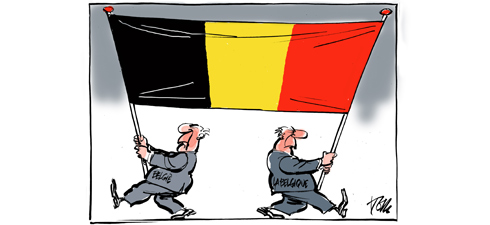For over 200 days now Belgium’s politicians have been trying in vain to put together a new government. Can the country do without a central authority? Amid the ongoing euro crisis, can Europe easily ride out a power vacuum in Brussels of all places? Or will the monarchy valiantly leap into the breach? Actually, none of the above.
Even the wiliest negotiators around can’t seem to come up with a mutually acceptable compromise anymore to unravel the old Gordion’s knot of power-sharing between the central government and the Flemish and Wallonian parts of the country. The situation has reached a total impasse. Not only experts in constitutional law, but even hardened Belgian citizens are asking what elections are held for in the first place if those elected can’t even form a functional administration.
Embittered Belgians relish the prospect of two new nations
Translated from the German by Eric Rosencrantz
**This content has been removed under request of the copyright owner.**
Albert II
The most powerful monarch in Europe
The last three and a half years of institutional chaos in Belgium have turned Albert II into “the only king with wide-ranging powers in Europe”, considers El Mundo. In the absence of a permanent government seven months after the elections, King Albert II recently asked caretaker prime minister Yves Leterme to cut the 2011 budget deficit. This “unprecedented gesture” coincides with increasing market pressure over Belgium’s inability to handle its high public debt, but in the country’s long-running political crisis the king had previously “mediated between political groups, named transition cabinets, given instructions to acting politicians and convinced leaders to continue negotiating”. El Mundo explains Albert II “already had experience in reigning without government”, because in 2007 it took Leterme nine months to become prime minister, but now “the missions he entrusts are more precise and more political”. The Spanish daily concludes that the Belgian king “has seen his powers reinforced in practice by the paralysis of a country unable to negotiate conciliation between the Flemish and French-speaking populations”.
Was this article useful? If so we are delighted!
It is freely available because we believe that the right to free and independent information is essential for democracy. But this right is not guaranteed forever, and independence comes at a cost. We need your support in order to continue publishing independent, multilingual news for all Europeans.
Discover our subscription offers and their exclusive benefits and become a member of our community now!












